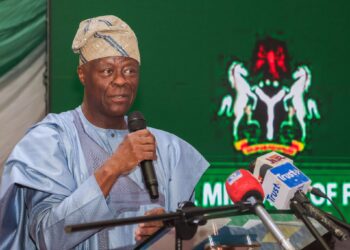The National Bureau of Statistics has said that Nigerians spent N61.07 trillion on household consumption in the first six months of 2023.
The figure is slightly higher by 2.83% (N1.68 trillion) than the N59.39 trillion recorded in the same period in 2022, amid persistent double-digit inflation.
The NBS disclosed this in its recent Expenditure and Income Gross Domestic Product (GDP) report released on Thursday.
According to the report, household consumption accounted for the biggest share of the expenditure of GDP.
The household consumption expenditure includes imputed expenditure incurred by resident households on individual consumption goods and services.
Highlights
- Household Consumption Expenditure, in Q1 and Q2 of 2023 grew by -24.95% and 3.30% in real terms, year-on-year.
- The growth rates in Q1 and Q2 of 2023 were lower than the rates recorded in Q1 of 2022 and higher than Q2 of 2022.
- Household Consumption accounted for the largest share of real Gross Domestic Product at market prices, representing 57.18% and 64.05% in Q1 and Q2 of 2023 respectively, compared to 78.02% and 63.65% in the corresponding quarters of 2022.
The report read:
- “The observed trend since 2020 indicates that real household consumption expenditure declined in Q1 and Q2 of 2020, accounting for negative growth rates informed by the pandemic. However, positive growth rates were recorded since Q3 of 2020 as recovery from the pandemic was witnessed, while growth became negative from Q2 of 2022 to Q1 of 2023 occasioned by rising prices, the cash crunch witnessed earlier this year as well as the current challenging economic conditions.
- “Furthermore, growth in Q2 of 2023 stood positive recorded at 3.30%, a departure from the negative trend recorded in the previous quarter. The growth rates of Q1 of 2023 and Q2 of 2023 indicate a lower rate relative to the corresponding quarter of Q1 of 2022 and a higher rate compared to Q2 of 2022. On a quarter-on-quarter basis, real household consumption expenditure decreased by 20.29% in Q1 of 2023 and rose by 11.68% in Q2 of 2023.
- “In nominal terms, household final consumption expenditure grew by -0.26% in Q1, and 5.87% in Q2 of 2023. These growth rates were lower by 14.47% points and 18.23% points than the figures recorded in the same quarter of the previous year which stood at 14.20% and 24.10% respectively.
- “On a quarter-on-quarter basis, growth was recorded at -18.11% in Q1 of 2023, and 9.28% in Q2 of 2023, compared to the preceding year of -2.59%, and 2.95% in the corresponding quarters. Household consumption accounted for 57.18% of real GDP at market prices in Q1 of 2023, and 64.05% in Q2 of 2023.”
More Insights
With rising inflation, Nigerians have had to pay more for the same or lesser items.
Nairametrics reported Nigeria’s inflation rate increased to 27.33% for the month of October- an 18-year high. The figure represents a 0.61% increase from what was recorded in the previous month and marks a ten straight month of increased inflation.
Nigeria is expected to continue facing economic instability in 2024 due to double-digit inflation.
Also, the CBN recently stated that current inflationary pressures may continue in the near term.
The NBS, in its Commodity Price Index report for October 2023, disclosed that key sectors that drove up inflation figures were food and alcoholic beverages, housing, water, electricity, gas and other fuel, clothing and footwear, and housing, which Nigerians spend on daily.






















